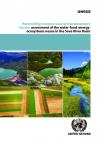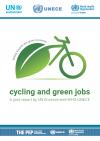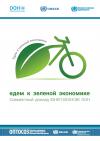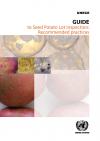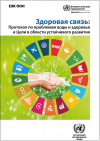Publications
Displaying Results 821 - 840 of 2807
- English
Coordination between the water, energy, food and environment sectors is fraught with difficulties at the national level and the complexity increases substantially in transboundary basins. The “nexus approach” to managing interlinked resources has emerged as a way to enhance water, energy and food security by increasing efficiency, reducing trade-offs, building synergies and improving governance
- English
Riding towards green economy: Cycling and green jobs – A joint report by UN Environment-WHO-UNECE presents the results of a study undertaken by the Transport, Health and Environment Pan-European Programme (THE PEP). It builds on the 2014 publication, Unlocking new opportunities – jobs in green and healthy transport, by reviewing the methods used in other studies to estimate the number of jobs
- Pусский
Переход к зеленой экономике является одним из ключевых заданий Повестки дня в области устойчивого развития на период до 2030 года. Это также одна из основных тем, затронутых во время восьмой Конференции министров «Окружающая среда для Европы», состоявшейся в Батуми, Грузия, 8-10 июня 2016
года. Транспортный сектор, который является одним из крупнейших субъектов экономики во всех странах, может
- English
The idea of viewing individuals’ knowledge and abilities as an asset—as human capital—can be traced back to the 18th century. But human capital is hard to define and measure. Policymakers are calling for ways to understand and quantify human capital, in order to better understand what drives economic growth and the functioning of labour markets, to assess the long-term sustainability of
- English
The publication provides a recommendation and good practice guidance on a Generic Law on Official Statistics developed jointly with the European Free Trade Association and Eurostat as part of a broader UNECE statistical capacity building project financed through the United Nations Development Account. The guidance aims to support further development of the legal and institutional frameworks
- English
The UNECE Group of Experts on Coal Mine Methane (CMM) has released the second edition of the Best Practice Guidance for Effective Methane Drainage and Use in Coal Mines. Since the first edition was published in 2010, the industry practice and regulations have evolved, and this second edition captures the most critical developments. The second
- English
This Guide refers to the UNECE STANDARD S-1, concerning the marketing and commercial quality control of Seed Potatoes. Knowledge of the relevant requirements is essential for the inspector.
Inspection is the visual examination of plants, tubers, containers, equipment or facilities by an authorized person, to determine compliance with regulations. Confirmation of symptoms can be supported by
- English
Across the UNECE region, and across most of the world, populations are ageing, bringing challenges and opportunities which require evidence-based policy responses. Ageing affects virtually all domains of society. The need for relevant statistics is therefore equally wide-ranging.Guided by the framework of the UNECE Regional Implementation Strategy for the Madrid International Plan of Action on
- English
The document aims to provide Parties with guidance in identifying the best abatement options for mobile emission sources, with particular reference to best available techniques, so as to assist them in meeting the obligations of the 1999 Protocol to Abate Acidification, Eutrophication and Ground-level Ozone.English
- English
The European Agreement concerning the International Carriage of Dangerous Goods by Inland Waterways (ADN) done at Geneva on 26 May 2000 under the auspices of the United Nations Economic Commission for Europe (UNECE) and the Central Commission for Navigation on the Rhine (CCNR) has been in force since February 2008. The Agreement currently has eighteen Contracting Parties.The Regulations
- English
Circular migration – a repetition of migration by the same person between two or more countries – is a topic of growing importance, on which information is needed for policy development. To meet this demand, tools must be established to better measure the extent to which existing international migration patterns become more (or less) circular over time and to evaluate policies aiming at
- English
An upper-middle income country, Albania is in the process of implementing an all-encompassing reform effort to foster national competitiveness and achieve greater integration into global value chains.Driving these reforms is the imperative for fulfilling the requirements of the European Union (EU) Acquis Communautaire, which gained new life in 2014 when Albania
- English
This report provides an overview of hazard rating systems used by competent authorities in various UNECE member States for prioritising resources and directing attention to chemical hazard sites and industries where it is most needed. The report describes each system without attempting to analyse or compare differences or similarities. The purpose of the report is to give countries insight
- English
Following the annual Market Discussions of the Committee on Forests and the Forest Industry (former Timber Committee), the Committee issues a statement which includes: overview of the forest products sector, developments in specific forest product market sectors, sawn softwood and sawn hardwood, wood-based panels, wood raw materials including wood energy, pulp and paper, certified forest
- English
The checklist for contingency planning for accidents affecting transboundary waters was prepared by the Joint Ad Hoc Expert Group on Water and Industrial Accidents, following a decision by theConference of the Parties to the Convention on the Transboundary Effects of Industrial Accidents (Industrial Accidents Convention) at its sixth meeting (The Hague, 8–10 November 2010) and theMeeting of
- Pусский
Water, sanitation and health are at the core of the 2030 Agenda for Sustainable Development.The 1999 Protocol on Water and Health is a powerful tool to promote and operationalize the achievement of the 2030 Agenda and its Sustainable Development Goals. With its strong integrated and intersectoral approach, its focus on prevention and on the whole water cycle and its attention to safety and
- English
Water, sanitation and health are at the core of the 2030 Agenda for Sustainable Development.The 1999 Protocol on Water and Health is a powerful tool to promote and operationalize the achievement of the 2030 Agenda and its Sustainable Development Goals. With its strong integrated and intersectoral approach, its focus on prevention and on the whole water cycle and its attention to safety and
- Français
The Guidance Note on the development of action plans aims to help countries in translating the priorities identified through the self-assessment into actions. Specific Equitable Access Action Plans are needed to guide country (or sub-national entity) efforts to achieve equitable access to water and sanitation by identifying priority actions to be implemented and ways of implementing them. The
- English
The Guidance Note on the development of action plans aims to help countries in translating the priorities identified through the self-assessment into actions. Specific Equitable Access Action Plans are needed to guide country (or sub-national entity) efforts to achieve equitable access to water and sanitation by identifying priority actions to be implemented and ways of implementing them. The
- Pусский
The Guidance Note on the development of action plans aims to help countries in translating the priorities identified through the self-assessment into actions. Specific Equitable Access Action Plans are needed to guide country (or sub-national entity) efforts to achieve equitable access to water and sanitation by identifying priority actions to be implemented and ways of implementing them. The


